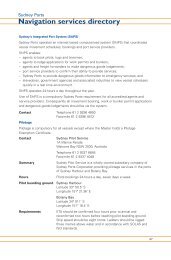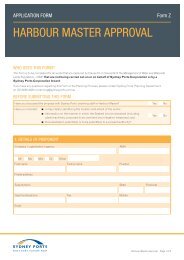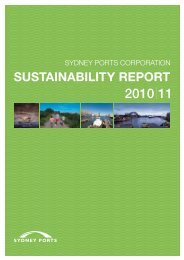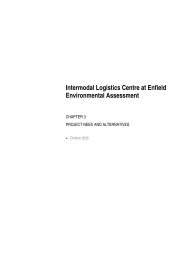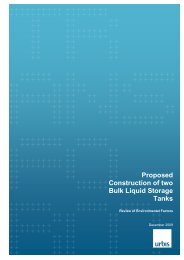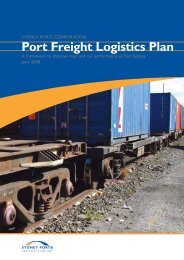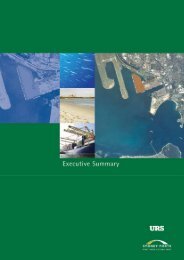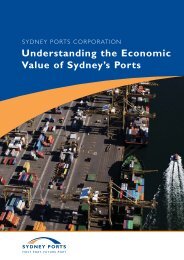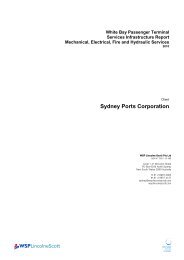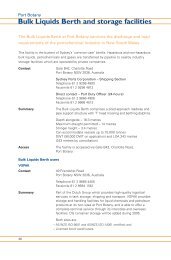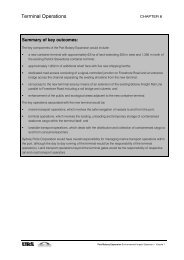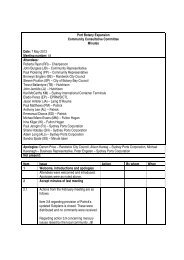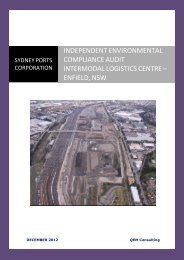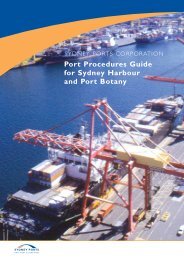SYDNEY PORTS CORPORATION ANNUAL REPORT 12
SYDNEY PORTS CORPORATION ANNUAL REPORT 12
SYDNEY PORTS CORPORATION ANNUAL REPORT 12
Create successful ePaper yourself
Turn your PDF publications into a flip-book with our unique Google optimized e-Paper software.
eeo rePort<br />
Sydney Ports Corporation continues to be an equal employment opportunity (EEO) employer, creating an environment<br />
which is free from harassment, discrimination and vilification.<br />
Our Equal Opportunity policy confirms our commitment to fair and equitable business practices and is complimented by<br />
our Discrimination, Harassment and Workplace Violence policy which clarifies unacceptable behaviour and the anticipated<br />
consequences if such behaviour continues to occur in the workplace. Our Grievance policy ensures the confidential, timely<br />
and effective resolution of any workplace grievance or dispute.<br />
Our processes and procedures supporting these three policies have been regularly updated and communicated to<br />
employees. There were no grievances raised during the reporting period.<br />
As a State Owned Corporation, we measure ourselves against the NSW Government benchmarks as outlined by the NSW<br />
Public Service Commission. Information is collected bi annually through the Workforce Profile which monitors data<br />
centred on age, gender, EEO group membership and employment information including hours worked, leave, remuneration<br />
and mobility. Data collection is anonymous, with employees having the right to nominate that their data be withheld from<br />
the collection. Approximately 30 per cent of employees of Sydney Ports have requested that their data be withheld. Where<br />
there is insufficient information supplied or the numbers are too low, a “NA” is displayed.<br />
PerCentaGe of totaL Staff at 30 jUne (exCLUdinG CaSUaL Staff)<br />
benChmark/<br />
eeo GroUP<br />
tarGet 2010 2011 20<strong>12</strong><br />
Women 50% 31% 26.8% 28.6%<br />
Aboriginal people and Torres Strait Islanders 2.6% by 2015 1.0% 0.9% 0.7%<br />
People whose first language was not English 19% 21% 21% 19.4%<br />
People with a disability No benchmark NA 0.7% 0.7%<br />
People with a disability requiring work-related adjustment 1.1% (2011)<br />
1.3% (20<strong>12</strong>)<br />
1.5% (2013)<br />
NA 0% 0.0%<br />
diStribUtion index (exCLUdinG CaSUaL Staff)*<br />
benChmark/<br />
eeo GroUP<br />
tarGet* 2010 2011 20<strong>12</strong><br />
Women 100 81 85 85<br />
Aboriginal people and Torres Strait Islanders 100 NA NA na<br />
People whose first language was not English 100 94 99 94<br />
People with a disability 100 NA NA na<br />
People with a disability requiring work-related adjustment 100 NA 0 na<br />
* A distribution index of 100 indicates that the centre of distribution of the EEO group across salary levels is equivalent to that of other staff.<br />
Values less than 100 mean that the EEO group tends to be more concentrated at lower salary levels than is the case for other staff. The more<br />
pronounced this tendency is, the lower the index will be. An index more than 100 indicates that the EEO group is less concentrated at the lower<br />
salary levels.<br />
Sydney PortS CorPoration annUaL rePort 2011/<strong>12</strong> 99



